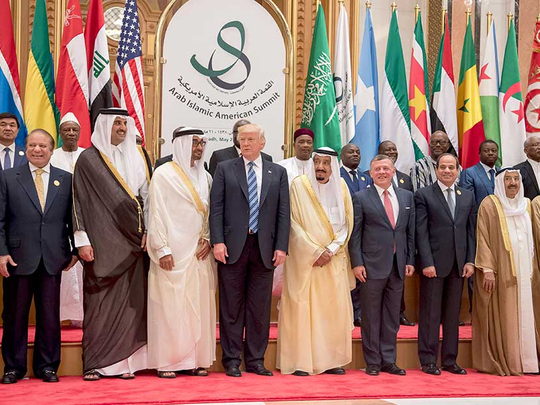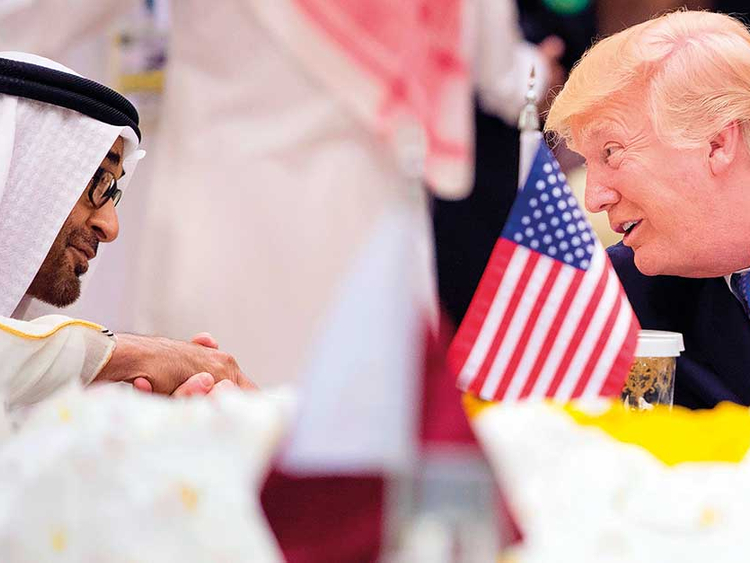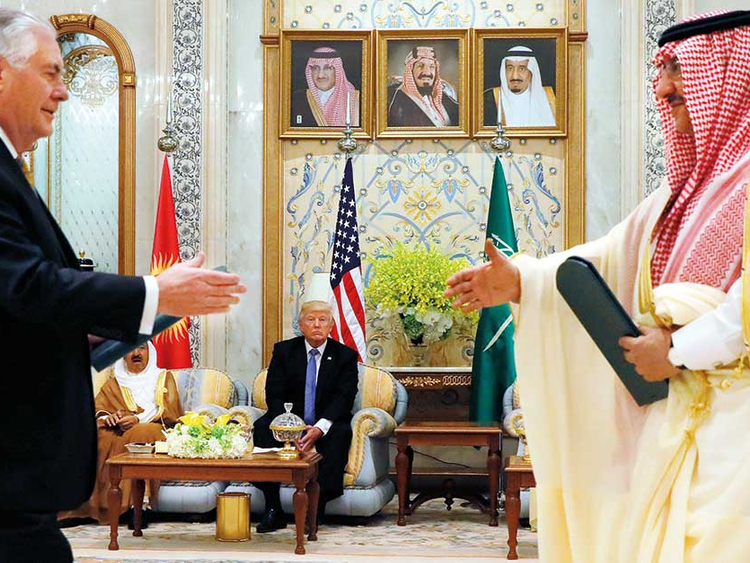
Abu Dhabi: People in the region have welcomed the long-awaited resurgence in America’s historical alliances with Gulf Cooperation Council (GCC) states following US President Donald Trump’s first visit to the Middle East since his inauguration on January 20.
Trump participated in three summits during his visit to Saudi Arabia. These included a bilateral summit with Saudi King Salman Bin Abdul Aziz, the GCC-US summit with leaders, or representatives, of the six-member GCC – Bahrain, Kuwait, Oman, Qatar, Saudi Arabia and the UAE, and a summit with leaders from the GCC, Arab and Islamic countries.
The summits that gace Trump an opportunity to announce major alignments against extremism and terrorism were deemed highly successful by the participating countries and the US.
Now, people in the region want to see the pledges and commitments announced on Saturday and Sunday take shape.
“The summits held in Riyadh have restored the time-honoured, strategic relationship between the US and the GCC member countries, dating back to [32nd US President Franklin D.] Roosevelt, to the right path,” said Dr Mohammad Bin Huwaiden, chairman of the Political Science Department at UAE University.
Bin Huwaiden told Gulf News that Trump showed that he had abandoned the policies of [former President Barack] Obama and instead supported a coalition of nations with a common goal of stamping out terrorism and containing Iran’s expansionist policies.
“Trump showed that the region is very important to America, and his administration has adopted a strategy similar to that of [37th US President Richard] Nixon, that is committed to a strong alliance with the Gulf, based on common interests,” Bin Huwaiden said.
The Trump administration, he said, showed it will be committed to supporting the Saudi-led coalition against the Iran-backed Al Houthis in Yemen.
Bin Huwaiden cited the sale of a whopping $110 billion worth of military hardware to Saudi Arabia, which includes “tanks and helicopters for border security, ships for coastal security, intelligence-gathering aircraft, a missile-defence radar system, and cybersecurity tools, which, he said, forms part of a 10-year, $350 billion agreement in a “strategic vision” between the two countries.
“With God’s help, this summit will mark the beginning of the end for those who practice terror and spread its vile creed,” Trump said.
Dr Abdul Khaleq Abdullah, professor of political science and chairman of the Arab Council for Social Sciences, said that the US under Trump has allied with the Gulf on three issues — confronting Iran’s expansion and dismantling its militias in Yemen, supporting the Saudi-led coalition in Yemen and stamping out post-Daesh terror and Iran’s militias in Iraq.
Trump stressed that Tehran funds, arms and trains militia that spread destruction and chaos, adding that Iran fuels the fires of sectarian conflict and terror. “Until the Iranian regime is willing to be a partner for peace, all nations of conscience must work together to isolate it,” he said.
Dr Abdullah said it seems that Daesh days are numbered, with Trump insisting that fighting terrorism is “a battle between good and evil”, not between “different faiths, different sects, or different civilisations”.
“The region will be better off in the next half of this year, with the countdown being started for the war in Yemen. In Syria, the situation is better with the strong support of the US, paving the way for more serious negotiations to bring in stability to the war-torn Syria,” Dr Abdullah said.
He quoted Trump as saying in his speech to the Arab and Muslim leaders in Riyadh on Sunday that if the world doesn’t unite to fight Daesh, Al Qaida, Hezbollah, Hamas and other groups, he said, ‘not only will we be judged by our people, not only will we be judged by history, we will be judged by God,” Trump said.
Dr Abdullah stressed that Trump has a clear understanding that Tehran funds, arms and trains militia that spread destruction and chaos, and that Iran fuels the fires of sectarian conflict and terror. “Until the Iranian regime is willing to be a partner for peace, all nations of conscience must work together to isolate it.
However, Dr Ebtisam Al Ketbi, chairwoman of Emirates Policy Centre, warned Arabs against unrealistic expectations and called on them to be more cautious about what the Trump and his administration will deliver, given the challenges he is facing at home.
“The region today looks more hopeful that President Trump is seizing the right moment to be on the right side of history, but we have to be more cautious and go on with our policy to diversify partnerships with China, Russia and other powers,” Dr Al Ketbi said.
Gassan Charbel, editor-in-chief of Asharq Awsat, wrote that the summits succeeded in finding and consolidating common grounds that would be beneficial for all parties in the days ahead.
“It took Saudi Arabia, a country with deep legitimacy at the Arab and Islamic levels to launch the war on extremism itself and make it a fixed item in its internal and external policies and a daily practice in society. Any observer realises quickly that the core of the Riyadh summits is the battle against extremism and building robust bridges with the others who then become partners in stability and prosperity,” he said.
“It can be said that the first bridge is the war on extremism. The Riyadh summits confirmed that this decision has been actually taken and that the war had begun. From this partnership, which dispels fears and doubts, we can start building economic, political and defense relations. They have to be based, at all times, on interests because countries are not charities.”
Charbel said that peoples and countries have to be realistic while building on the Riyadh pledges.
“There comes a time when you have to choose and this applies to both individuals and nations. In order to belong to the future, there is a price that must be paid. You cannot enter the future alone. You need partners. You need the others. The messages of the Riyadh summits are very significant.
“In order to keep abreast with developments and rescue their economies, our countries need the scientific and technological progress possessed by the others. We also need a partnership of interests that will encourage the US President to play a greater role in the fair settlement of the issues of our region, including the Palestinian-Israeli conflict,” he wrote.
Mohammad Jabier, a Bahraini analyst, told Gulf News that he was pleased with the public pledge made by Trump to Bahrain’s King Hamad Bin Eisa Al Khalifa about the end of strains with the US administration.
“Trump was very clear about relations with Bahrain and we look forward to starting a new chapter with the US,” he said. “We have deep-rooted relations that go back 120 years during which there has never been any problem, and we do remain committed to the special bonds that we have shared. There were strains in the past because we could not see eye to eye with the former administration and there were terrible misunderstandings. As we are forward-looking people, we want to move ahead and resume the special bonds. This can be done easily through the regular meetings and action plans between our two countries. Neither of us is a novice and we share the same attitudes towards fighting violence, terrorism and extremism while promoting pluralism, tolerance and peaceful existence. These are robust foundations that should make the process of building on them easy and solid.”














